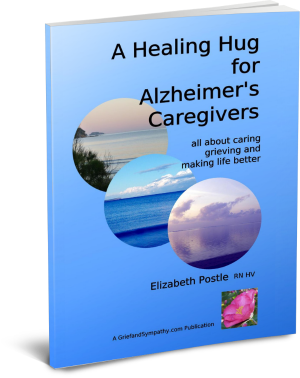The Hidden Grief of Alzheimer's Caregivers
Alzheimer's Caregivers have to cope with a lot of stress. Many are battling alone without even a diagnosis, let alone any support or access to resources. This story illustrates the problem and demonstrates the importance of asking for help.
Walking through our quiet village one day I came across a lady carrying a dog lead. “Hello, where are you going?” I asked. “I’m taking the dog for a walk,” she replied. Well, since there was no dog at the end of the lead, I realised that there was a problem.
At the time, my husband and I were running our nursing home for high dependency residents in the Old Rectory next to the village church, so I had experience of people with Alzheimer’s and had a fairly good idea of what was happening to this lady.
I went round to see her husband, and he was so relieved to have someone to talk to about it. Basically, he’d been in denial. He was frightened and ashamed to talk to anyone about it, and was trying to hide what was going on and cope by himself.
Denial is a very common form of grief and makes it difficult to get the help you need as a caregiver for a loved one with Alzheimer's or dementia.
After a chat over a cup of tea, I persuaded him that his wife needed to be diagnosed properly and needed professional care. He coped for a while longer with support but eventually, this lady became one of our residents.
Once she was living with us, her husband came every day, but now, he had all the other residents, families and staff to talk to. He and his wife could both join in all the activities we had going on, and he could enjoy a chat and some quality time, knowing that his wife was being cared for properly.
We had children from the local school visiting to sing to everyone, our cats and the little dog of one of our staff members kept everyone amused too. At Christmas he would join us for the celebrations and his lunch.

Grief and isolation are common in Alzheimer's Caregivers
This gentleman who was trying to cope at home alone with his wife, is an example of what happens with a lot of Alzheimer's caregivers. He was grieving for the capable wife he had lost, and had ended up with a helpless and dependent, childlike person to care for with no support.
There is still a stigma attached to mental illness and he was embarrassed to admit to his wife’s behaviour. This was even more isolating for him.
It's important that we all recognise the signs of Alzheimer's in its early stages
We need to raise awareness of the plight of those battling along at
home alone. We need to realise that their loved one’s personality is
disappearing in front of their eyes and they will be suffering many of
the emotions of grief. This gentleman was in denial and shock. He was
quite depressed and frightened of what was happening.
It was
fortunate I recognised the signs of Alzheimer’s when I did and was able
to reach out. My experience nursing those with Alzheimer’s and dementia
helped me to do that, but I fear what happens to those who slip through
the net.
Instead of being frightened of mentioning what is
going on, we all need to reach out to those in need of help. These days
we all live busy lives, and often don’t even know our neighbours. It’s
important to be aware of what is going on around us; that people can be
grieving even when their spouses, or parents are still with them.
I
would urge everyone, don’t ignore strange or worrying behaviour. Talk
to the family about it. Urge them to seek professional help. The
sooner loved ones are diagnosed, the better they can be helped, and
their families supported.
If you are a caregiver trying to cope at home – don’t be ashamed of admitting that you have a problem. The grief of having a family member with dementia is doubly difficult as no-one realises you are grieving.
Reach out and ask for help. Tell someone how you are feeling and that you are worried. There is help out there and there are others who do understand what you are going through.
My book was written with Alzheimer's Caregivers in mind. It gives practical and emotional support as well as education for those who care for people withdementia of all types.
For more information about what's in the book click on the image:
A Healing Hug for Alzheimer's Caregivers
Related Pages:
Coping with Home Care for a Loved One with Alzheimer's
- Grief and Sympathy Home
- Alzheimer's Spouse Grief
- Alzheimer's Caregivers




